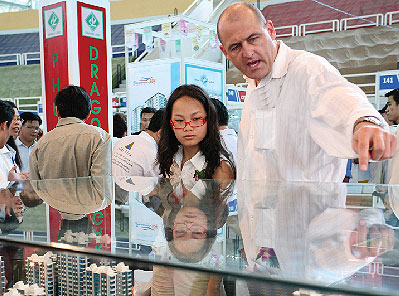Caution over instant foreign property boom
 Despite wildly optimistic predictions from officials, other analysts remain more cautious about foreign buyers Photo: Le Toan |
Hoang Quynh Phuong, head of the residential sales department under Savills Vietnam, said that although the new regulation would likely increase the sale of property amongst foreigners in Vietnam, the majority of domestic developers were hesitant to formulate a plan to capitalise on this opportunity until the detailed guidelines for this discerning market segment were revealed.
“Developers are mostly waiting for the detailed guidelines from the authorities before announcing their strategy to attract buyers for this segment of the market,” Phuong said.
Foreigners are generally regarded as requiring solid, good quality developments, and developers must have time to prepare their products to meet this need, Phuong added.
Doan Chi Thanh, chairman of the Hoang Anh Sai Gon Real Estate Company said that developers were not yet targeting foreigners buyers.
The supply of high-end properties does not yet meet the demands of the foreign market. Also, even when the rights are relaxed, many foreigners are likely to lease instead of buying a property outright.
Reiterating Thanh’s reading of the market, the chairman of CEN Group Pham Thanh Hung said that the current products available are mostly only meeting the demand of domestic buyers, and as such the number of foreigners likely to buy houses in the near future is not likely to increase dramatically.
“Out of nearly 100,000 foreigners who are living and working in Vietnam, I estimate that only 10 per cent are interested in buying houses here,” Hung said.
In his recent visit to Vietnam, Desmond Sim, head of CBRE Research of Southeast Asia, said that although the amended Law on Housing increased the rights of foreigners to buy houses in Vietnam, many other related issues needed to be outlined to reassure foreign buyers. Chief among these concerns is what will happen once the 50 years of ownership rights expires, or if foreigners want to withdraw from their investments.
“What rights will they have? Will be they able to transfer their investment value abroad? These are outstanding questions which need to be addressed,” Sim said.
Despite these concerns, there is still some hope that the incoming amended Law on Housing will attract more foreigners to buy houses either for personal use or sub-leasing in Vietnam.
If this happens to be the case, it may go some way towards reducing the huge stockpile currently existing in the real estate market.
According to Ministry of Construction – the body which have framed the amended law – this move will drive larger amounts of foreign currency into the market, and will help drive up the quality of housing across the board.
Figures from the Land Management General Department under the Ministry of Natural Resources and Environment, however, show that towards the end of 2014, out of the official figure of 80,000 foreigners living and working in Vietnam, less than 200 registered to buy houses here. Meanwhile, about 600 overseas Vietnamese registered to buy property.
What the stars mean:
★ Poor ★ ★ Promising ★★★ Good ★★★★ Very good ★★★★★ Exceptional
Latest News
More News
- An Phat 5 Industrial Park targets ESG-driven investors in Hai Phong (January 26, 2026 | 08:30)
- Decree opens incentives for green urban development (January 24, 2026 | 11:18)
- Public investment is reshaping real estate’s role in Vietnam (January 21, 2026 | 10:04)
- Ho Chi Minh City seeks investor to revive Binh Quoi–Thanh Da project (January 19, 2026 | 11:58)
- Sun Group launches construction of Rach Chiec sports complex (January 16, 2026 | 16:17)
- CEO Group breaks ground on first industrial park in Haiphong Free Trade Zone (January 15, 2026 | 15:47)
- BRIGHTPARK Entertainment Complex opens in Ninh Binh (January 12, 2026 | 14:27)
- Ho Chi Minh City's industrial parks top $5.3 billion investment in 2025 (January 06, 2026 | 08:38)
- Why Vietnam must build a global strategy for its construction industry (December 31, 2025 | 18:57)
- Housing operations must be effective (December 29, 2025 | 10:00)
















 Mobile Version
Mobile Version